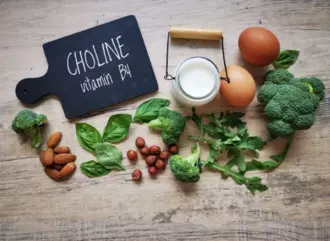Choline: An Essential Nutrient You May Not Know About
Choline was officially recognized as an essential Nutrient in 1998. An essential nutrient is one that the body can not produce enough of on its own and requires an exogenous (external) dietary source. Choline is involved in the regulation of mood, memory and muscle control as well as neurotransmitter synthesis and lipid transport in the liver. Choline is found naturally in many foods. The following highlights some of its benefits, food sources, recommended intakes and considerations for specific groups.
What is Choline?
Choline is essential for the construction of cell membranes and the production of molecules that act as cell messengers called neurotransmitters. Moreover, choline is crucial for brain development, nerve function, muscle movement, and metabolism.
Health Benefits of Choline
- Brain Health: Choline is vital for brain development and function. It's involved in memory, mood, muscle control, and other brain and nervous system functions.
- Liver Function: This nutrient helps prevent fat accumulation in the liver, aiding in its proper function.
- Metabolism: Choline plays a role in the process of turning food into energy.
- Pregnancy and Breastfeeding: Adequate choline levels are particularly critical during pregnancy and breastfeeding, given its role in fetal brain development and prevention of neural tube defects.
Dietary Sources
Choline is found in various foods common in the Canadian diet. Rich sources include:
- Eggs: Particularly the yolks are a rich choline source.
- Meat and Poultry: Beef, liver, and chicken are excellent sources.
- Fish: Fatty fish like cod and salmon are good choline providers.
- Dairy Products: Milk, yogurt, and cheese contain choline.
- Vegetables: Potatoes and cruciferous vegetables like broccoli, cauliflower and Brussels sprouts.
- Soy beans and quinoa
- Nuts and Seeds: Especially almonds and peanuts.
Recommended Intakes
The recommended Adequate Intake (AI) of choline varies by age, sex, and life stage:
- Infants: 125-150 mg
- Children (1-8 years): 200-250 mg
- Teens (9-13 years): 375 mg
- Adult men: 550 mg
- Adult women: 425 mg
- Pregnant women: 450 mg
- Breastfeeding women: 550 mg
These recommendations ensure that most people receive enough choline to support their health without supplementation.
Considerations for Specific Groups
- Pregnant and Breastfeeding Women: Increased choline intake supports fetal and infant health including the prevention of neural tube defects.
- Athletes: May require more choline to support endurance and muscle performance.
- Vegetarians and Vegans: Since high choline levels are mainly found in animal products, vegetarians and especially vegans need to be mindful of their intake and consider fortified foods or supplements if necessary. Source of the nutrient Betain such as beets, quinoa, spinach and wheat can be a substitute source for choline.
Genetics
Research shows that variation in the MTHFD1 and PEMT genes can also impact dietary choline needs. Choline’s function is tightly linked to the metabolism of folate due to overlapping roles in the same metabolic pathways. Individuals who carry the A allele of the MTHFD1 gene and the CG or CC variants of the PEMT gene are at higher risk of developing clinical signs of choline deficiency when choline intakes are very low. These individuals should be sure to meet the (AI) adequate intake for choline and folate. Genetic testing through a nutrigenomics dietitian can inform you if you have this variant or not.
Choline Deficiency
There may be a link between low intakes of choline and the risk of developing NAFLD (Non-alcoholic fatty liver disease), a condition in which fat builds up in the liver of people who do not drink excessive amounts of alcohol.
Some research also shows that low levels of serum choline levels may be associated with increased risk for neural tube defects in pregnancy.
Supplementation and Safety
While food sources are the best way to obtain choline, some people may consider supplements, especially if their diet lacks variety. Some multivitamin or B-complex supplements may contain choline, phosphatidylcholine or lecithin.
Excessive intake of choline can lead to side effects such as low blood pressure, fishy body odor, gastrointestinal discomfort, and, in severe cases, liver damage. The upper intake level for adults is set at 3,500 mg per day to prevent these adverse effects.
The Bottom Line
Choline is an essential nutrient that supports various crucial functions in your body. By including choline-rich foods in your diet, you can help ensure your body operates at its best. Whether you're pregnant, an athlete, or someone looking to optimize their health, choline is a nutrient worth your attention. For more personalized nutrition recommendations to help you achieve optimal nutritional status and fitness level, test your DNA and get a full nutrigenomics report on 70 modifier genes through Diana Steele, RD. www.eatingforenergy.com















